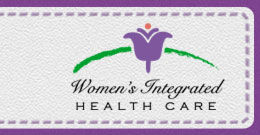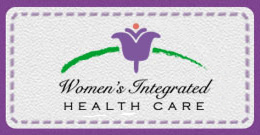Integrated Healthcare for Women

What is integrated health care?
With integrated health care, our health professionals collaborate to provide a range of treatments to enhance overall wellbeing.
Our health care team members from different medical fields share information on patient care and draw up a comprehensive treatment plan to address the biological, psychological and social needs of the patient.
This coordinated care improves access to health services and quality of care, and reduces overall health care costs. People get the care they need when they need it, in a more convenient way, and with more support for emotional wellbeing as well as physical health.
What is an integrated health care system?
Integrated health care systems – or integrated delivery systems – are partnerships of health service providers who plan and implement combined inpatient and outpatient health care services.
They create a more efficient and effective health care structure with a patient-centered focus that better meets people’s health care needs.
Our system is completely integrated clinically and operationally, with services delivered by a diverse group of health professionals, including physicians, nurses, and psychologists, depending on your needs.
What are some examples of integrated health care systems?
One example of an integrated health care system in the U.S. is the Essential Hospitals setup. It focuses on integrated care to meet the complex needs of people with chronic illnesses or those who’re economically disadvantaged or non-English speakers.
Integrated care delivery is a critical tool in overcoming the challenges of these types of cases to provide safe, cost-efficient and better-quality care. The need for this was emphasized in the 2010 Affordable Care Act (ACA).
Another example of an integrated health care system is Women’s Integrated Health Care. We provide a range of gynecological services at several clinics across Michigan. These services include well-woman care, infertility treatment, vulvodynia treatment, ambulatory and inpatient gynecological surgery, and comprehensive obstetric care – from preconception counseling to delivery and postpartum treatments.
Why is women’s integrated health care so important?
The health of families and communities is tied to the health of women, who often provide the foundation for a family’s overall health. If they have access to quality health care, this can facilitate better health care for their children.
Another reason that women’s integrated health care is so important is that in many societies women and girls face discrimination rooted in sociocultural factors. This can result in obstacles to attaining optimal health and is why female health is of particular concern worldwide.
Factors that can damage women’s physical and mental health include:
- Power bias in relationships with men.
- Physical, sexual and emotional violence.
- Social norms that limit educational opportunities and paid jobs.
What is the most important issue in women’s health?
One of the most important aspects of women’s health is that a woman’s well-being reflects her individual biology as well as her sociocultural, economic and physical environment – considerations that affect duration and quality of life.
Historically, women have also been the primary health care providers and health decision-makers for their families.
A critical factor in women’s integrated health care is ensuring reproductive health. Another important issue in women’s health is that they’re made aware they’re at greater risk than men from certain medical conditions, including breast cancer, osteoporosis, autoimmune diseases, depression, and heart disease – the leading cause of death among American women.
Our support is in working with medical issues for women. If your interest is more cosmetic in nature, then we would recommend visiting such clinics as AI Beauty Clinic who deal solely with cosmetic procedures.
How is a woman tested for infertility?
Female fertility tests can take some time because infertility is a complex condition.
Diagnosis typically includes:
- Initial assessment, taking into account medical and sexual history.
- Measuring body mass index (BMI).
- Pelvic examination.
- Blood tests.
- Chlamydia test.
- Ultrasound scan or X-ray of womb and fallopian tubes.
If tests like these don’t result in a conclusive diagnosis, a laparoscopy may be performed by making a small incision in the lower tummy to insert a camera at the end of a thin tube.
Infertility treatment varies according to the cause, the woman’s age, how long they’ve been infertile, and personal preferences. Some women may need only one or two treatments to restore fertility but in other cases several different types of therapies may be needed.
What causes infertility in women?
Infertility in women is commonly caused by glitches with ovulation – the monthly release of an egg from the ovaries. An egg may not be released at all or only during some cycles.
Ovulation issues can be a result of thyroid problems – an underactive or overactive thyroid gland – or polycystic ovary syndrome (PCOS). Premature ovarian failure may also occur – the ovaries stop working before the age of 40.
Other infertility issues include previous pelvic surgery that has scarred the fallopian tubes linking the womb to the ovaries, or cervical surgery that has scarred or shortened the neck of the womb (the cervix).
What is osteoporosis?
Osteoporosis occurs when bones become porous and weak and more vulnerable to fracture.
Bone is metabolically active – living tissue that changes throughout life, with old bone being continuously broken down and replaced with new bone. Osteoporosis develops when the body fails to form sufficient new bone and/or too much old bone is reabsorbed by the body. The most common causes of osteoporosis are ageing, low body weight, and genetics.
Broken bones due to osteoporosis are more common in women because:
- Bones weaken faster after menopause as estrogen hormone output decreases.
- Women tend to have smaller bones, which increases the risk of fracture.
- On average, women tend to live longer, and bones get weaker with age.
Can osteoporosis be prevented?
Nothing can be done about two causes of osteoporosis – aging and family history. But the risk of osteoporosis through low body weight can be decreased by achieving a higher body mass index. A BMI of less than 18.5 indicates being underweight, and a weight gain program may be recommended.
A healthy lifestyle in general – including exercise and a nutritious diet – also helps to reduce the risk of osteoporosis by ensuring bones remain as healthy as possible. Being active builds and maintains strong bones, while nutrients that help to keep bones in good condition include calcium and vitamins B and D.
What does obstetrics mean?
Obstetrics is combined with gynecology as a medical specialty called ob/gyn.
Obstetricians provide health care and treat complications unique to pregnancy, childbirth, and the postnatal period, and perform surgeries related to labor and delivery.
Comprehensive emergency obstetric and newborn care (CEmONC) provides interventions to treat pregnant women and newborns experiencing serious complications. Treatments include cesarean sections, manual removal of placenta, and resuscitation of the baby.
Gynecologists specialize in the female reproductive system and look after women’s sexual and reproductive health, but don’t treat women who’re pregnant.
What is a Preferred Women’s Health Center?
A Preferred Women’s Health Center such as ours, provides reproductive health services and specializes in compassionate abortion care. The organization has clinics in safe and convenient locations in the southeastern U.S., in Atlanta, Charlotte, Raleigh and Augusta, with private appointments available.
We prescribe abortion pills and perform surgical and non-surgical vacuum aspiration abortion procedures. Other services include pregnancy tests, ultrasound, abortion counseling including psychology counselors offering emotional support, and helping women in need to find financial assistance.
What is thermage
Thermage is a procedure offered by skin clinics that tightens skin. It works by stimulating collagen growth and results in smoother skin.
This is a cosmetic treatment not offered by our clinic but you can research many clinics who do offer it.
Microneedling
Microneedling is an alternative treatment for the regeneration of collagen.It uses needles to stimulate the skin.
Microneedling is often referred to as collagen induction therapy because the needles delivered into the skin stimulate collagen production. Collagen plays an important role in helping to restore the natural elasticity of skin.
Hair Transplants for women
For many women, hair loss typically begins later in life, but an increasing number are experiencing it at a younger age. Several factors can trigger female hair loss, including hormonal imbalances, pregnancy, and menopause. The experience of losing hair can have various negative impacts, such as reduced self-esteem and depression. Read more about hair transplants for women.
Our clinic
In order to make your visit as comfortable as possible we have refitted our public areas including wall coverings and carpet tiles on our floors.
We look forward to looking after you if you decide to visit.
What are 5 ways for women to keep healthy?
Experts recommend that women maintain their health by:
- Exercising daily. Obesity is linked to breast cancer, uterine cancer, and colon cancer. Maintaining a healthy weight by exercising 30 minutes a day reduces these risks and also improves cardiovascular health and body mass index.
- Eating healthily. Like exercise, a healthy, nutritious diet including plenty of fruits and vegetables lowers the risk of problems fueled by obesity.
- Getting regular Ob/Gyn screening. See an obstetrician or gynecologist once a year for preventive screenings that can detect issues such as ovarian cancer or cervical cancer.
- Check your breasts. You should perform monthly breast self-exams to check for signs of cancer. Women from the age of 40 also need to get annual mammogram screening, which can detect breast cancer early – critical to facilitate early intervention for the best outcome.
- Stopping smoking: If you smoke, you’re at far greater risk of life-threatening medical conditions such as heart disease, heart attack, stroke, and cancer. A smoking-cessation program may help you kick the habit.
What are 5 ways for women to keep healthy as they get older?
According to the Food and Drug Administration (FDA), the best ways for women to age healthily are:
- Staying active. Exercise and physical activity play an important role in staying fit and healthy. You don’t have to go to a gym. Ask your healthcare provider about safe ways you can be active.
- Maintaining a healthy diet. Food hygiene and good nutrition and are particularly important as you get older. You may become more vulnerable to food poisoning. You also need to make sure you maintain a balanced diet.
- Managing medical conditions. It’s crucial to work with your healthcare provider to manage illnesses such as diabetes, osteoporosis, and high blood pressure.
- Avoiding common medication mistakes. Medicines can treat health problems and help you live a long, healthy life. But if used wrongly, they can also cause serious health issues. Always make sure you read the instructions that come with prescription or over-the-counter medications.
- Getting health screenings. Health screenings such as mammograms and Pap smears can detect problems before they develop into a serious issue, even if you don’t yet have any symptoms. Ask your healthcare provider which health screenings are right for you and how often you should get screened.
What are the challenges faced by women today?
Five of the most common challenges facing women in the 21st century are:
- Cancer: Millions of women worldwide die from cervical cancer or breast cancer. That’s why screening such as Pap smears and mammograms are imperative.
- Much progress has been made in breaking the glass ceiling over the years, but sexism can still be found in many areas of society in more subtle forms.
- Domestic violence. Physical and sexual abuse and emotional and psychological abuse continue to be a major problem for women.
- Mental health problems. Research suggests that women are more likely than men to experience anxiety, depression, and sleep disorders.
Sexually transmitted infections – STIs such as gonorrhea, chlamydia and syphilis
What are 2 medical disorders that only affect women?
Two medical conditions that women get and men don’t are:
- Turner syndrome. This condition arises when one of the X chromosomes is completely or partially missing. Turner syndrome can cause a range of medical and developmental issues, including shortened height, failure in ovarian development, and heart defects.
- Menstrual irregularities. Changes in the menstrual cycle can result in missed periods, irregular periods, absence of menstruation (amenorrhea), painful cramps (dysmenorrhea), and excessive bleeding (menorrhagia).
What are 4 problems of the female reproductive system?
Common reproductive health issues in women include:
- This condition occurs when the type of tissue that lines the uterus develops on the ovaries, behind the uterus, or on the bladder or bowels.
- Uterine fibroids. It’s not known what causes uterine fibroids – muscle cells and other tissues that grow in and around the wall of the uterus or womb. These tumors, which aren’t cancerous, develop in women of childbearing age.
- Gynecologic cancer. Gynecologic cancers – including cervical cancer and ovarian cancer – start in a woman’s reproductive organs within the pelvis.
- Polycystic ovary syndrome. PCOS happens when cysts – fluid-filled sacs – develop on the ovaries. The condition is caused by the ovaries or adrenal glands producing too many male hormones.
What should every woman know about her body?
Here are three things every woman should understand about her body.
- Your periods. Most women get their period around every 28 days, but it's different for everyone so it’s easy to forget when your monthly period is due. Knowing the exact date of your monthly cycle is important so you can tell if something's wrong.
- Your breasts. Inspecting your breasts regularly can help detect breast cancer early. So you need to know what your breasts feel like normally. Due to hormonal changes, your breasts may feel different at various time of the month so check them at the same time each month.
- Your weight. How much you weigh can be a useful health indicator. Women’s weight can fluctuate by a few pounds throughout the month, because of hormones. However, unexpected weight loss is a sign of a change within your body.
What is the number 1 health issue for women?
Heart disease – including heart attacks and coronary artery disease – is the No. 1 cause of death in women.
The most common symptom of coronary artery disease (CAD) is angina – chest pain when plaque builds up inside arteries, causing them to narrow.
Chest pain can also indicate a heart attack, and other symptoms of a heart attack include:
- Shortness of breath
- Weakness in arms.
- Light-headedness.
- Vomiting
- Cold sweat.
While menopause doesn’t cause heart disease, some risk factors are more common after it, including higher blood pressure and cholesterol and lower estrogen.

The physicians at Women’s Integrated Health Care (WIHC) are board certified OB/GYNs, whose purpose is to provide comprehensive and quality health care.
Women’s Integrated Health Care was formed the common beliefs, ideals and goals of its physicians … patients come first, without exception.
Women’s Integrated Health Care offers a variety of gynecologic services including well woman care, infertility treatment, vulvadynia treatment, ambulatory and inpatient gynecologic surgery and comprehensive obstetric care from preconception counseling, to delivery to postpartum services.

